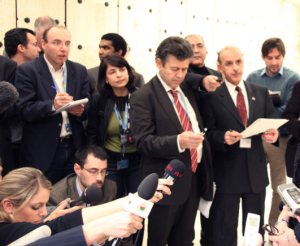Toeing the Line: Using Comedy in the Practice of Public Relations
Published on March 25, 2016, at 6:50 p.m.
by Drew Pendleton.
Professionalism comes with the territory of entering the world of public relations. In a fast-moving industry where every step a PR pro takes can make a difference, the use of humor in a campaign may seem like a risky proposition.
However, as Julia Kirby of the Harvard Business Review noted, in a world where “customers are inundated with communications,” they sort through the clutter and “gravitate instantly to those they find most fun.” As communication continues to progress alongside the audiences it serves, integrating comedic elements into one’s strategies and tactics can be what Michael Gerard of Curata called “an excellent approach to increasing readership and engagement.”
Sheila Kenny, owner of Right On! PR in Austin, Texas, has seen comedy take a central role in her career. While working as a music publicist, she met comedian Eugene Mirman, of “Flight of the Conchords” and “Bob’s Burgers” fame, who she said asked her to help with press for his tour as the opening act for the band Modest Mouse.

“This was also at the time when comedy shows were just beginning to move from comedy clubs to music venues and alternative spaces,” Kenny said. “So it was a natural fit that I could go back to some of these music writers and editors who I had gained relationships with via music PR to pitch Eugene as comedy opener on a music tour. Then later he toured his own stand-up through their cities and performed in those music venues; it grew from there.”
Brittany Brave, publicity manager at The Syndicate in Weehawken, New Jersey, also began her PR career in music at Columbia Records in New York City. Her background in performance, from theater and improvisation to music and competitive dance, led her to transmit her onstage passion into a career in communication. She emphasized that as a publicist, finding one’s niche is important.
“It’s great to be a multi-faceted, talented publicist, but find your niche,” Brave said. “In order to be an honest and successful advocate for something, it has to already be in your wheelhouse a bit. There has to be genuine passion and interest there before you represent it.”
However, when it comes to using comedy to gain publicity, practitioners may find themselves faced with a slippery slope. As David Sims of The Atlantic wrote in a March 2015 article on Justin Bieber’s Comedy Central roast, celebrities have begun to use an arena meant “to give comedians the chance to work out their nastiest material” as an attempt “to repair their shattered reputations by taking a few nasty jokes on the chin before concluding the event by making a few of their own.”

Brave said that there is a place for comedy in public relations, but like other types of communication, its subjective nature brings both a level of power and a level of responsibility. She added that using comedy also depends on how aware a practitioner is of their client’s public image.
“I think everyone has room to be funny, and everyone has room to be offended,” Brave said. “When working with comedians and musicians, if you’re aware of what you look like in the public eye, maybe you do want to wait. We’re all free to open and run our mouths, but we have to be prepared for the conversation to continue, positively or negatively.”
However, as Kirby noted in 2013, Kia’s use of hamsters in its commercials and the resulting campaign “is credited with spurring multiple years of double-digit growth in Kia’s U.S. sales.”
In this regard, Kenny said that comedy can contribute to public relations practice if done with respect to the client’s message and image.
“It’s important to show some personality in your work,“ Kenny said. “You want to be more than a number when you call or email your pitches. So be personable, and if part of your personality is to be light-hearted, show it. But obviously don’t be so silly as to not be taken seriously.”
Similarly, Brave noted the importance of creativity in standing out within the media landscape.
“We live in a really over-saturated world,” Brave said. “It’s really about learning how to go that extra mile so people pay attention and getting creative with new places to premiere something or roll something out. It’s not just you doing your job, but it’s you telling an artist or comedian’s story the way they want it told.”
However, Kenny also stressed the importance of not overdoing one’s project load as a publicist.
“Avoid being a publicist who takes on so many projects that you cannot give your all to your clients,” Kenny said. “They trust you with their art and brand. It’s always cool to do right by them.”




